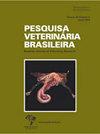Evaluation of troponin I and C in horses intoxicated by salinomycin
IF 0.8
4区 农林科学
Q3 VETERINARY SCIENCES
引用次数: 0
Abstract
ABSTRACT: Ionophores are antibiotics frequently used in animals of production. The most common are monensin, salinomycin, narasin, and lasalocid. The equine species is highly susceptible to ionophores poisoning. The present study aimed to analyze the serum use of cardiac troponin I (cTnI) and the anti-troponin C immunohistochemistry (IHC) technique (anti-cTnC) as a diagnostic tool for cardiac injuries in horses spontaneously poisoned by salinomycin. Seven horses were affected by a disease lasting for 6-72 hours. Three horses recovered. The primary morphological lesions reported in the four necropsied horses that died spontaneously were necrosis of the myocardium and skeletal muscle. Immunohistochemistry for anti-cTnC was performed in selected sections of the cardiac muscle from the equine submitted for necropsy. A decrease in cTnC expression in the cytoplasm of cardiomyocytes was noticed in all four necropsied horses. Samples of serum from six horses tested for cardiac troponin I levels; the most expressive values were mainly in horses with more severe cardiac histological lesions. The serum detection of cTnI can be considered a good marker to determine cardiac damage in horses intoxicated with salinomycin with a clinical evolution of 48 hours or more. The anti-cTnC IHC aided in the detection of cardiac injury in horses independent of clinical evolution.盐霉素中毒马肌钙蛋白I和C的测定
摘要:离子载体是生产动物常用的抗生素。最常见的是莫能菌素、盐霉素、那拉西素和lasalocid。马对离子载体中毒非常敏感。本研究旨在分析血清心肌肌钙蛋白I (cTnI)和抗肌钙蛋白C免疫组化(IHC)技术(anti-cTnC)作为诊断盐霉素自发性中毒马心脏损伤的工具。七匹马感染了一种持续6-72小时的疾病。三匹马康复了。据报道,在4匹自发死亡的死马中,主要的形态学病变是心肌和骨骼肌坏死。在提交尸检的马心肌的选定切片中进行抗ctnc免疫组化。4匹死马心肌细胞胞质中cTnC表达均下降。对六匹马的血清样本进行心肌肌钙蛋白I水平检测;最具表达价值的主要是心脏组织病变较严重的马。血清cTnI的检测可以被认为是确定盐霉素中毒马心脏损伤的一个很好的标志,其临床演变为48小时或更长时间。抗ctnc免疫结构有助于检测马的心脏损伤独立于临床演变。
本文章由计算机程序翻译,如有差异,请以英文原文为准。
求助全文
约1分钟内获得全文
求助全文
来源期刊

Pesquisa Veterinaria Brasileira
农林科学-兽医学
CiteScore
1.30
自引率
16.70%
发文量
41
审稿时长
9-18 weeks
期刊介绍:
Pesquisa Veterinária Brasileira - Brazilian Journal of Veterinary Research (http://www.pvb.com.br), edited by the Brazilian College of Animal Pathology in partnership with the Brazilian Agricultural Research Organization (Embrapa) and in collaboration with other veterinary scientific associations, publishes original papers on animal diseases and related subjects. Critical review articles should be written in support of original investigation. The editors assume that papers submitted are not being considered for publication in other journals and do not contain material which has already been published. Submitted papers are peer reviewed.
The abbreviated title of Pesquisa Veterinária Brasileira is Pesqui. Vet. Bras.
 求助内容:
求助内容: 应助结果提醒方式:
应助结果提醒方式:


